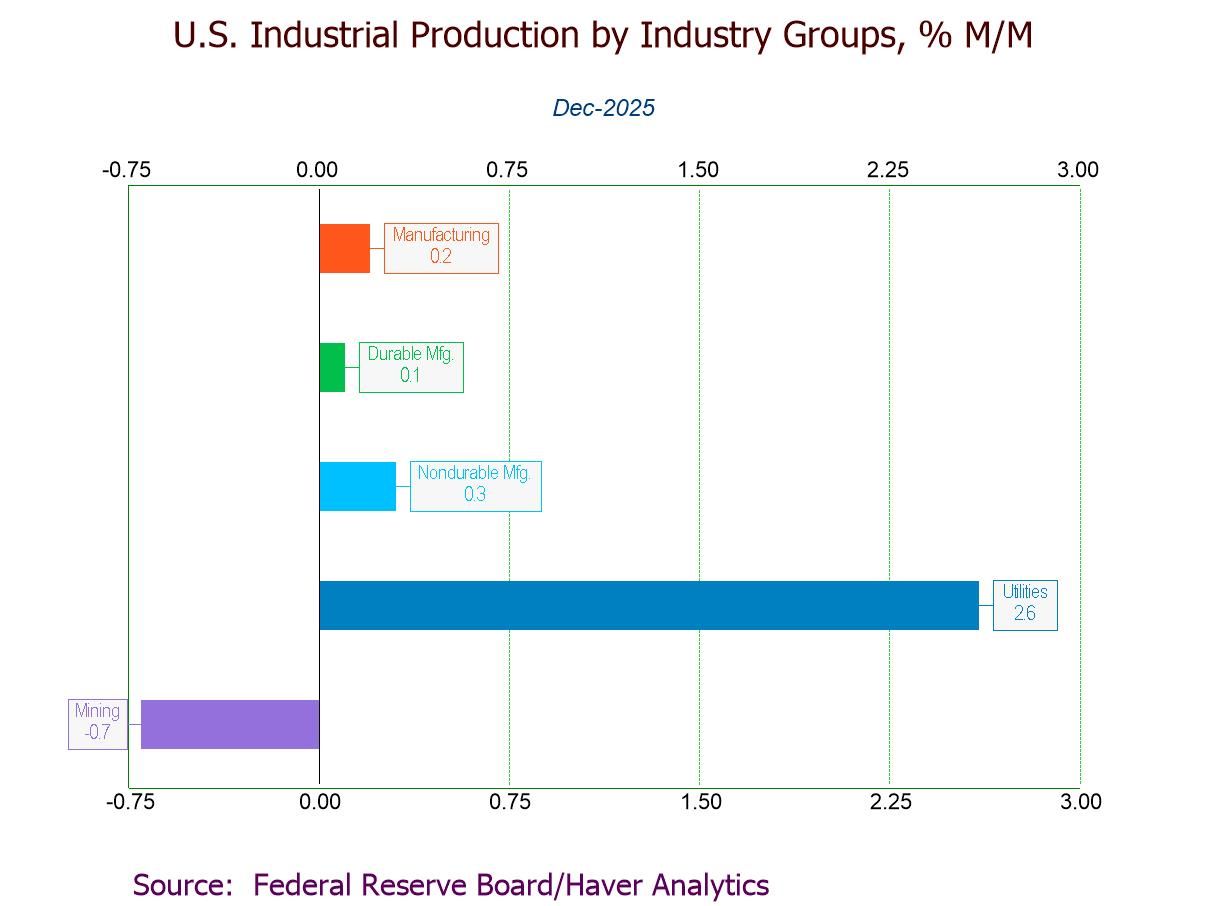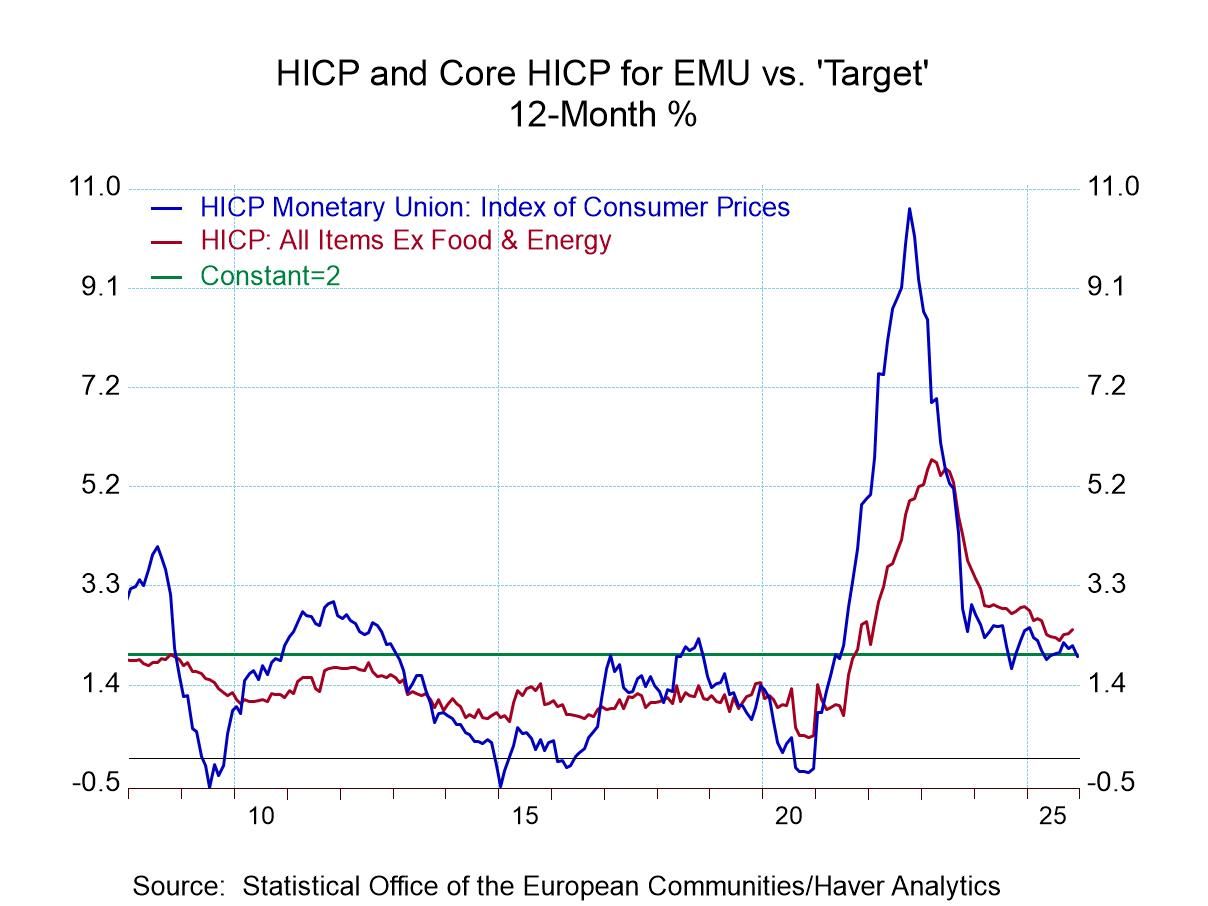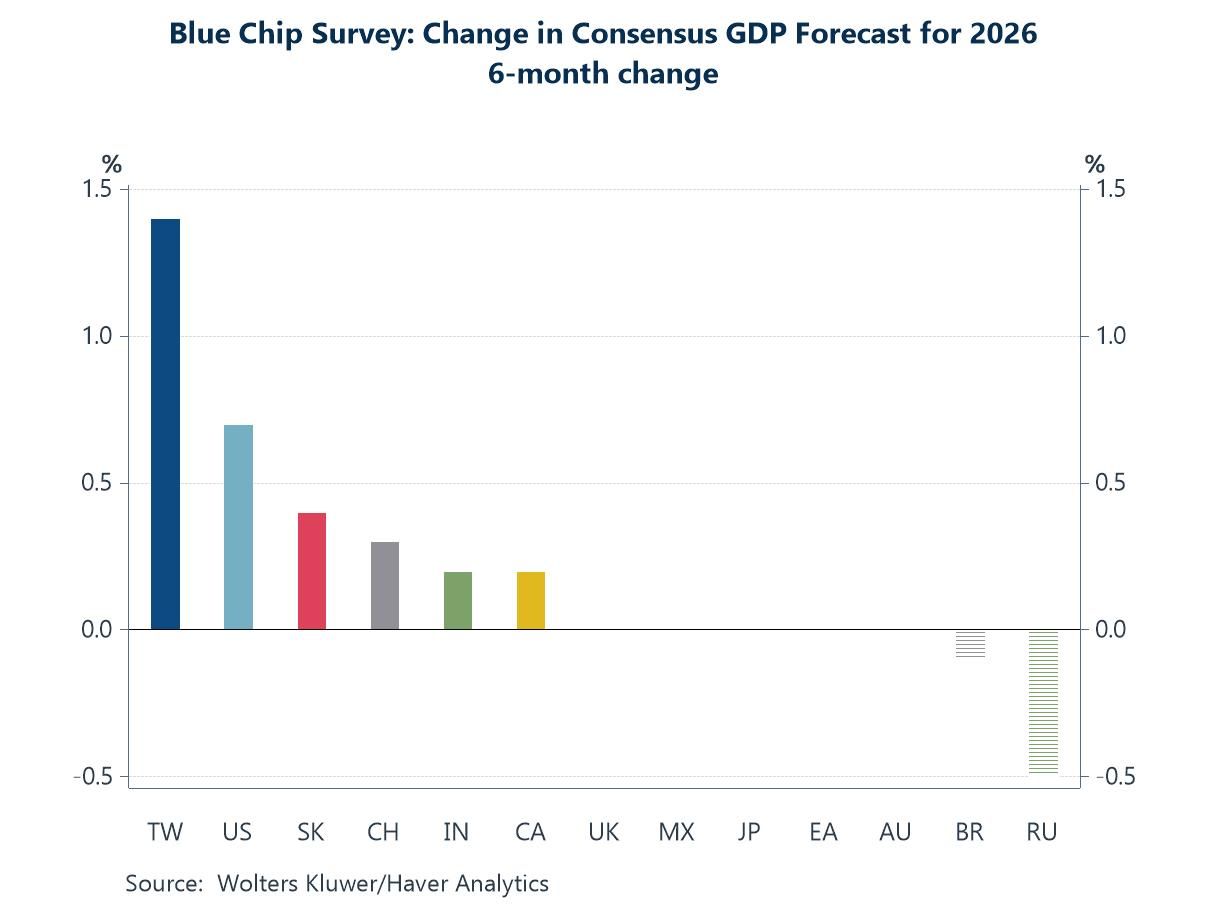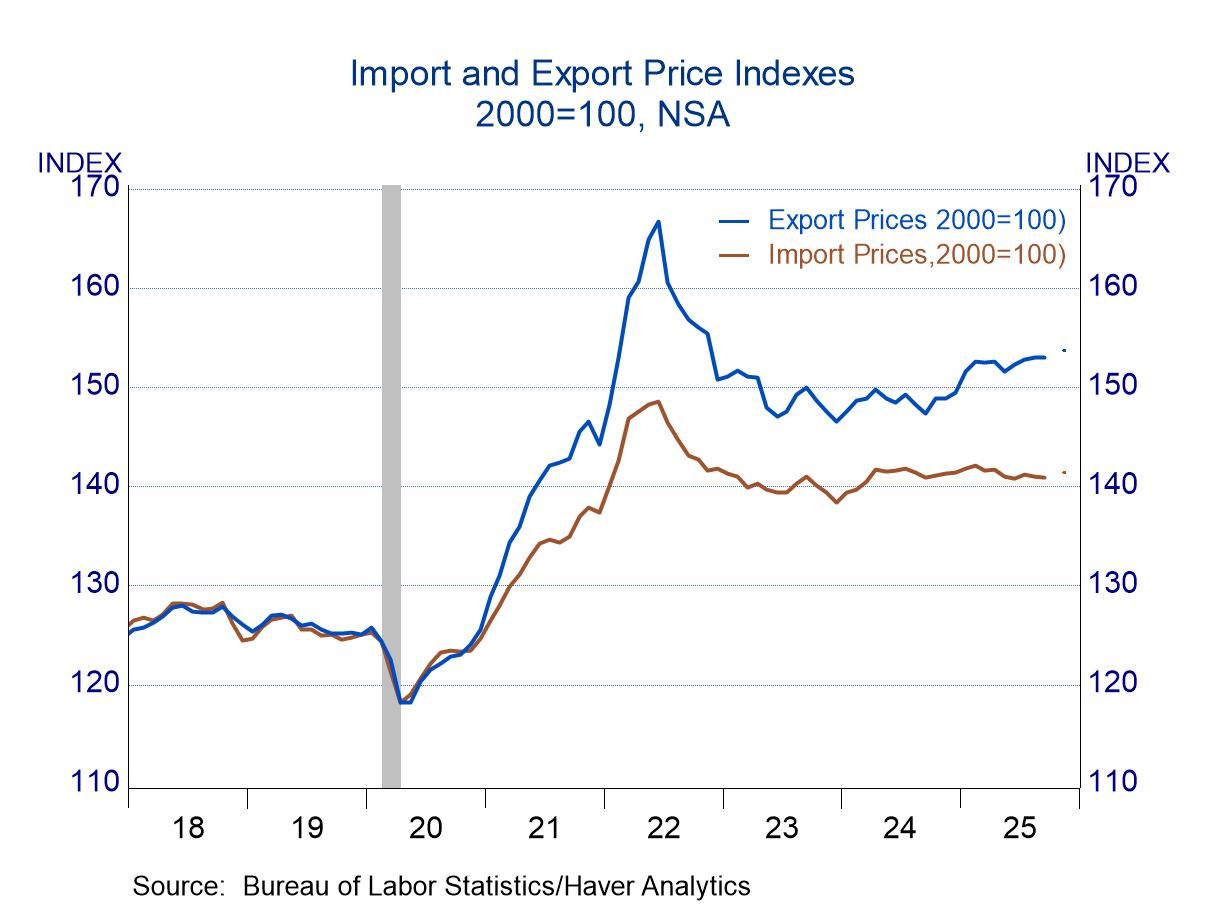 Global| Oct 11 2012
Global| Oct 11 2012U.S. Initial Jobless Insurance Claims Plummet
by:Tom Moeller
|in:Economy in Brief
Summary
Initial claims for jobless insurance fell sharply to 339,000 during the week ended October 6 versus a revised 369,000 during the prior week, initially reported as 367,000. Consensus expectations were for 368,000. The four-week moving [...]
by Tom Moeller October 11, 2012
The U.S. August foreign trade deficit deteriorated to an expected $44.2B from $42.5B in July. Exports fell 1.0% (+1.6% y/y) while imports slipped 0.1% (+1.0% y/y). In chained 2005 dollars, the deficit in goods deteriorated to $48.4B in August, its deepest since April. Real exports fell 2.6% (+2.4% y/y) but real imports slipped 0.9% (+2.9% y/y).
Overall U.S. exports declined 1.0% (+1.6% y/y) and in real terms they fell 2.6%. Real exports of foods, feeds & beverages led the decline with an 11.9% drop (+2.6% y/y). Real exports of nonauto consumer goods slumped 2.6% (+1.6% y/y) while real exports of autos & parts slipped 0.5% (+8.3% y/y). Offsetting these drops was a 1.0% rise 96.7% y/y) in real exports of capital goods and . Services exports slipped 0.3% (+2.3% y/y) as travel exports were essentially unchanged (6.7% y/y) and passenger fares fell 1.1% (+6.4% y/y).
Total nominal imports fell 1.5% (+2.2% y/y) in June, down for the third straight months, as goods imports fell 1.8% (+1.6% y/y). The decline in oil prices to an average $100.13 per barrel helped lower the value of petroleum imports in June by 7.5% (-14.1% y/y). When adjusted for prices, petroleum imports increased 0.2% (-8.8% y/y).
Elsewhere, there was weakness in imports led by real capital goods which were off 2.6% (+8.8% y/y). Real nonauto consumer goods imports also fell by 1.2% (-2.8% y/y) while real imports of foods, feeds & beverages dropped 1.9% (-1.0% y/y).Offsetting these declines were real imports of autos & products which rose 2.8% (28.2% y/y). Real imports of industrial supplies & material increased 1.2% (-3.3% y/y) while real imports of other goods gained 1.0% (4.5% y/y). Finally, nominal imports of services rose 0.3% (5.1% y/y) as passenger fares rose 3.4% (14.5% y/y) but travel slipped 0.4% (+7.6% y/y).
By country, the June goods trade deficit with mainland China deteriorated slightly m/m to $27.4B, its deepest since October. Exports to China increased 10.2% y/y while U.S. imports gained a lessened 4.5% y/y. With Japan, the deficit improved slightly to $6.0B as U.S. exports rose 10.9% y/y but U.S. imports soared 26.7% y/y. The deficit with the European Union eased to $8.4B with a 2.5% y/y gain in U.S. exports and a 2.0% y/y decline in imports.
The international trade data can be found in Haver's USECON database. Detailed figures are available in the USINT database. The expectations figures are from the Action Economics consensus survey, which is carried in the AS1REPNA.
| Foreign Trade | Aug | Jul | Jun | Y/Y | 2011 | 2010 | 2009 |
|---|---|---|---|---|---|---|---|
| U.S. Trade Deficit | $44.2B | $42.5B | $41.9B | $44.8B (8/11) |
$559.9B | $494.7B | $381.3B |
| Exports (%) | -1.0 | -1.1 | 1.2 | 1.6 | 14.2 | 16.7 | -14.5 |
| Imports | -0.1 | -0.6 | -1.5 | 1.0 | 13.9 | 19.5 | -23.0 |
| Petroleum | 5.2 | -6.0 | -6.6 | -9.4 | 30.7 | 32.5 | -44.0 |
| Nonpetroleum goods | -1.5 | 0.2 | -0.9 | 3.3 | 12.1 | 20.8 | -20.9 |
by Tom Moeller October 11, 2012
U.S. import prices rose 0.7% in August, the first monthly increase since March, driven by a 4.1% surge in petroleum. July's total decreased 0.7%, revised from -0.6% reported initially. The August total was actually somewhat lower than economists had forecast, with the Action Economics consensus survey calling for a 1.3% increase.
Import prices continued lower in most nonpetroleum categories, with that subtotal down 0.2% following a 0.3% decline in July. Food and beverages were off 0.9% after a 1.0% drop in July. Most nonoil industrial supply prices fell, but there were gains in nonoil fuels and some building materials so that category only edged down 0.1% after July's sharp 1.3% fall. Capital goods prices eased 0.1% and July was revised from -0.1% originally to flat overall in August. Automotive vehicles were also flat in August after a 0.3% rise in July while other consumer goods imports fell 0.3% in price, after a 0.1% decrease in July.
U.S. export prices were up 0.9%, led by agricultural items, which surged 5.1% following their strong 6.3% gain in July. Nonagricultural commodity prices rose 0.4%, an upturn after three consecutive declines. Food items were important here too, as processed foods and industrial agriculture-related items both gained roundly 5% in August. Capital goods export prices and automotive both declined in August by 0.2%, and consumer goods exports were flat. Total export prices were still down from a year ago, by 0.9%.
The import and export price series can be found in Haver's USECON database. Detailed figures are available in the USINT database. The expectations figure is in the AS1REPNA database.
Price Level Targeting: The Fed Has It About Right from the Federal Reserve Bank of St. Louis can be found here http://research.stlouisfed.org/econ/bullard/pdf/BullardEconomicClubofMemphisOct42012Final.pd
| Import/Export Prices (NSA, %) | Sep | Aug | Jul | Sep Y/Y | 2011 | 2010 | 2009 |
|---|---|---|---|---|---|---|---|
| Imports - All Commodities | 0.7 | -0.7 | -2.2 | 10.9 | 6.9 | -11.5 | |
| Petroleum | 4.1 | -2.1 | -6.4 | 36.5 | 28.4 | -35.9 | |
| Nonpetroleum | -0.2 | -0.3 | -0.9 | 4.5 | 2.8 | -4.1 | |
| Exports - All Commodities | 0.9 | 0.4 | -0.9 | 8.1 | 4.9 | -4.6 | |
| Agricultural | 5.1 | 6.3 | 7.7 | 22.3 | 7.9 | -12.8 | |
| Nonagricultural | 0.4 | -0.3 | -1.9 | 6.6 | 4.6 | -3.7 |
Tom Moeller
AuthorMore in Author Profile »Prior to joining Haver Analytics in 2000, Mr. Moeller worked as the Economist at Chancellor Capital Management from 1985 to 1999. There, he developed comprehensive economic forecasts and interpreted economic data for equity and fixed income portfolio managers. Also at Chancellor, Mr. Moeller worked as an equity analyst and was responsible for researching and rating companies in the economically sensitive automobile and housing industries for investment in Chancellor’s equity portfolio. Prior to joining Chancellor, Mr. Moeller was an Economist at Citibank from 1979 to 1984. He also analyzed pricing behavior in the metals industry for the Council on Wage and Price Stability in Washington, D.C. In 1999, Mr. Moeller received the award for most accurate forecast from the Forecasters' Club of New York. From 1990 to 1992 he was President of the New York Association for Business Economists. Mr. Moeller earned an M.B.A. in Finance from Fordham University, where he graduated in 1987. He holds a Bachelor of Arts in Economics from George Washington University.






